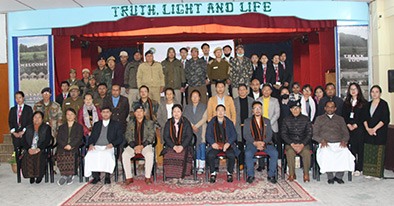ZIRO, 13 Mar: Saint Claret College, Ziro in collaboration with Tezpur (Assam)-based Lokapriya Gopinath Bordoloi Regional Institute of Mental Health’s (LGBRIMH) department of psychiatric social work (DPSW) and the police department here in Lower Subansiri district organized a sensitization programme on mental health and addiction on Saturday.
The sensitization programme was attended by about 80 participants, including police personnel, teachers and members of NGOs.
DPSW HoD Dr Sonia Pereira Deuri and DPSW Associate Professor Dr Sobhana H along with their team of six resource persons conducted the technical sessions from Tezpur through videoconference.
While Dr Sobhana H said that the target audience, comprising police personnel, teachers and NGOs “are the gatekeepers of the society,” Lower Subansiri DSP Tasi Darang said the topic was relevant “in the light of the arrest of drug peddlers in Ziro a few days ago.”
Lower Subansiri Narcotics Officer Takhe Riniyo highlighted the legal implications of drug addiction and peddling. She sought the cooperation of the youths and the NGOs to combat the menace of drug addiction.
The other resource persons dealt with topics such as ‘Understanding mental health and ill health’ (Abhijeet Singh); ‘Causes of mental health disorders’ (Mamata Rani Swain); ‘What is addiction? Causes and symptoms’ (Smitakhi Mahanta); and ‘Healthy living for healthy life’ (Royina Mahanta).
The topics ‘Impact of addiction – Physical, mental, family and social’, and ‘Dealing with addiction: What can the individual, family and others do?’ were dealt with by Drs Arif Ali and I Banerjee, respectively.
The speakers stressed on how substance abuse can lead to poor mental health and depression. They said addiction can be a sign of mental illness and can negatively impact the growth and stability of the state. In young adults, they said, substance abuse causes suicidal tendencies. The speakers also stated that most of the studies carried out in the Northeast region suggest that elderly people suffer from hypertension due to substance abuse.
The sessions were interactive in nature with the participants posing relevant queries to the resource persons who clarified the doubts of the participants.





